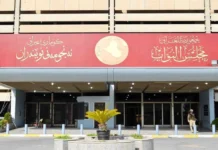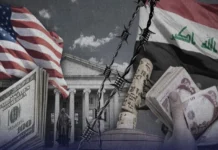Tishwash: this was in Iraq’s news
Indonesia launches economic stimulus package to boost consumption
Indonesia’s Coordinating Ministry of Economic Affairs announced that the country intends to announce an economic stimulus package on June 5 to stimulate economic activity and boost consumer purchasing power.
This package comes with the hope of raising the economic growth rate to about 5% during this quarter.
Encouraging growth through increased consumption
Indonesia’s Chief Economic Minister, Airlangga Hartarto, stated in a statement that these programs are designed to encourage growth through increased consumption, adding that launching this package before the school holidays, which begin in late June, will provide impetus to boost purchasing power.
The weakest growth rate in more than three years
Southeast Asia’s largest economy grew by 4.87% in the first quarter of 2025 compared to the same period last year, its weakest growth rate in more than three years. The central bank lowered its growth forecast for 2025 to between 4.6% and 5.4% from a range of 4.7% and 5.5%.
Package size evaluation
A ministry spokesperson said the ministry is still assessing the size of the stimulus package, which aims to boost growth in the second and third quarters.
The incentives include a 50% discount on electricity bills for approximately 79.3 million households and the distribution of food aid to 18.3 million low-income households during June and July. The government also plans to provide cash transfers to low-income workers and a discount on industrial accident insurance for workers in labor-intensive industries.
To encourage tourism, the government announced discounts on airfare, train, and ferry tickets during the school holidays, which run until mid-July, and discounts on highway tolls for 110 million users during June and July, according to the ministry. link
Tishwash” Masrour Barzani invites the US Secretary of State to visit Erbil.
Kurdistan Regional Government Prime Minister Masrour Barzani announced on Friday evening that he had extended an official invitation to US Secretary of State Marco Rubio to visit Erbil.
This came in press statements following his meeting with Rubio in the US capital, where he affirmed that his meeting with the US Secretary of State was “successful,” noting that he “extended an official invitation to him to visit the region.”
“We discussed with Rubio the latest developments in the region,” Barzani said.
This meeting comes as part of Masrour Barzani’s official visit to Washington, which includes a series of meetings with US administration and congressional officials to strengthen bilateral relations and discuss regional issues of common interest. link
************
Tishwash: Iraq and the Season of Absolute Powers: No Oversight or Budget… A “Political Emergency” Paralyzes the State
Hopes for the passage of the 2025 budget in Iraq are gradually fading, amid a political landscape marked by legislative stagnation, a nearly paralyzed parliament, and a government seemingly more preoccupied with managing political balances than fulfilling constitutional and financial obligations.
In this context, Member of Parliament Jawad Al-Yasari affirmed on Friday (May 23, 2025) that next year’s budget schedules “have become a thing of the past,” indicating the impossibility of passing it at the present time.
Absent parliament… no prospect of holding sessions
In a statement to Baghdad Today, the leftist said, “The Iraqi government has no real seriousness in sending the 2025 budget schedules, and even if it did send them—which is unlikely—it would be impossible to pass them in light of a paralyzed parliament, with no sessions, no quorum, and no deputies.”
He pointed out that holding parliamentary sessions “has become extremely difficult, due to the preoccupation of blocs, parties, and even MPs themselves with election campaigns and ongoing preparations for the general elections. This means that the new budget schedules will not be discussed or approved, and the Ministry of Finance will continue to work with the remaining 2023 and 2024 budget schedules.”
A government in a political impasse
These statements highlight a deeper dilemma facing the Iraqi government, which had pledged at the beginning of this year to submit the budget schedules before the end of the first quarter, according to statements made by Cabinet spokesman Bassem Al-Awadi. However, the passage of months without submitting the schedules reflects either a delay in the government’s ability to formulate them within the timeframe, or political considerations preventing their passage amid a tense and unstable parliament.
Finance between reality and maneuver
According to sources from the Ministry of Finance, government spending will not cease in the absence of 2025 budgets, as the provisions of Article (13) of Financial Management Law No. 6 of 2019 allow reliance on previous years’ budgets to cover basic current expenditures, most notably salaries, social support, and temporary employment. However, the absence of a budget effectively freezes investment spending, halts new projects, and disrupts the work of ministries and governorates.
The political impasse… when the state is frozen by an unannounced decision
The absence of financial tables is not merely a procedural flaw; it reflects a complex, deeply rooted political crisis. The paralysis of parliament due to electoral polarization and the lack of coordination between the government and the House of Representatives reveal that Iraq’s constitutional institutions operate not according to the state’s rhythm, but rather according to the rhythm of alliances. This makes major decisions, such as the budget, a direct victim of any political confusion.
In this context, observers believe that the elections have transformed into something resembling a “political state of emergency,” in which the state is temporarily frozen, legislation and oversight are halted, projects are suspended, and decisions are postponed. In the absence of an effective parliament, the executive branch is left without institutional balance, opening the door wide open to the expansion of powers in the hands of the executive branch.
Indeed, some warn that repeating this model reinforces the logic of a temporary state—a state run by momentary orders, instructions, and assessments, rather than annual budgets and plans.
The economy is in a state of anticipation… neither recession nor growth
Economically, the absence of a 2025 budget schedule pushes Iraq into a gray zone: not a state of collapse, but also not one of stable growth. Salaries are being paid, and current expenditures are proceeding, but there is no clear economic horizon, no approved spending priorities, and no transparent investment map. This leaves the private sector in a state of “waiting freeze,” unable to make expansionary decisions amid the ambiguity of public policies.
Stalled projects are likely to accumulate, domestic and foreign debts lack legislative cover for settlement, and promised development plans are stuck in the drawers of ministerial committees. In the governorates, project implementation is contingent on central allocations that never materialize, and some are managed through primitive “transfers” that reproduce local financial chaos.
Economists agree that the continuation of this pattern deprives the budget of its most important political and economic functions: setting priorities, controlling the deficit, stimulating growth, and distributing wealth fairly.
Management crisis or system crisis?
The absence of budget schedules for next year cannot be reduced to the scene of an absent parliament. Rather, it reflects a structural flaw in the relationship between the authorities, where planning and development priorities are being undermined by political rivalries and electoral gains. While the government continues to spend according to outdated schedules, infrastructure projects, administrative reform, and social service programs remain suspended on the ropes of lost time. link





